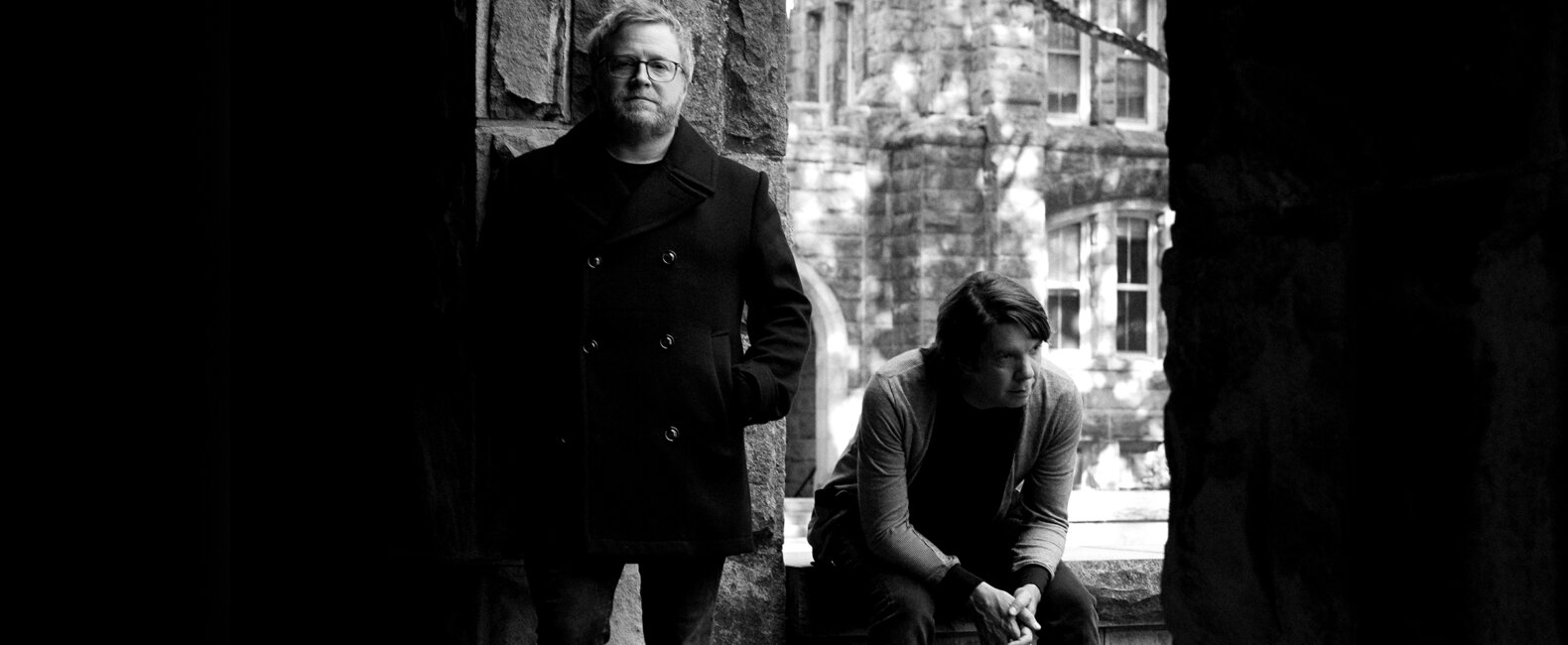Even though Hammock’s latest album, Mysterium, was created in the aftermath of a personal tragedy — the death of member Marc Byrd’s nephew — the band is leery of romanticizing the relationship between sorrow and art too much. “There’s this mistaken idea that in order for art to be genuine, it has to come from some darkness or grim reality,” Marc told us via speakerphone, from bandmate Andrew Thompson’s recording studio outside of Nashville. “Good art can be a response to the sadness and suffering we go through in life, but it can also come from light and joy.”
In many ways, Mysterium does both. It’s a dark, somber album — it is a requiem, after all — but it refuses to wallow in its own grief. It is, you might say, purposeful grief — ultimately a movement toward hope, maybe even joy. It is a masterpiece, and we are thrilled to have it in our Musicbed library.
Listen to their new album, Mysterium, and read our interview with Hammock below.
LISTEN TO ‘MYSTERIUM’
This new album, Mysterium, is very personal.
Marc: We’d started working on a record after Everything and Nothing, and it was going to be more electronic. But while we were working on that, my nephew passed away. When I got back from the funeral, we totally shifted gears. I wasn’t in the mood to work on electronic music. All I could listen to was choral music. It was the only thing that didn’t make me cry. Choral music gave me comfort. And that feeling sort of found its way into the work. The record took on a life of its own. It’s funny with these beatless records — or mostly beatless records — once we get started, it tends to happen pretty fast.
Andrew: Yeah, almost in spite of ourselves. We had enough material for an entire electronic record; but when this thing started happening, it came so naturally. Kind of fluidly. I don’t even know if that’s a word. It just seemed right. The pieces fit together really well. It’s like the record took off on its own, and we just held on.
Marc: It feels good when the music flows that way. I mean, there’s always work involved. There’s always fine-tuning. There’s always finding the right finishing element. We used a big choir and a larger string session, and we did things we hadn’t done on previous records. But it wasn’t intimidating. For me, Everything and Nothing was much harder to make than this one.
Grief was obviously a part of this record’s creation. Has your music been a response to that kind of emotion before? And is the process of creation a cathartic experience?
Marc: I mean, if you look at any of our album titles — Oblivion Hymns, Departure Songs, etc. — it’s obvious that impermanence and death are always there. The reason those are strong subjects for us is because we are so connected to presence, and whatever absence we’re feeling is because we miss the presence of whatever is gone. Departure Songs has a little bit of that. Oblivion Hymns has some of that. The piano piece, “Take a Drink from My Hands,” was about my cat dying of cancer. I’d say there are plenty of times where I’m playing something on the guitar or keyboard, and I have a specific person in my mind’s eye who has died. Or a relationship that’s ended. But Mysterium is definitely more intentional. We were experiencing grief while we created it.
Andrew: It was a purposeful requiem. We embraced that.
Marc: It was cathartic but also painful. There were times — Andrew probably doesn’t know this — when I had to leave the room because of the emotions it tapped into.
Andrew: We were doing strings and we’d look over at one another, and we’re in tears.
Marc: It’s never been that way on our other records.
Is this how you prefer to work? Is the emotion you’re tapping into immediate? Or do you normally prefer to have some distance and perspective from the event?
Marc: I’ll tell you this, even though Mysterium was an emotional response to a tragic event, there’s this mistaken idea that in order for art to be genuine, it has to come from some darkness or grim reality. People are too enamored by the dark side of life. When you have something extremely tragic happen, like the death of a child, it’s silly to act like darkness is some kind of edgy, cool thing. When you experience something like that, it hits you hard, and you realize you don’t want to romanticize the darkness anymore. You don’t wish that darkness on anybody. Good art can be a response to the sadness and suffering we go through in life, but it can also come from light and joy.
You said this album came together quickly. Do you feel like there’s a correlation between how easily the music comes and how good it is?
Marc: Not always. Andrew and I write a lot of music, and most of it doesn’t make it on a record. On most of our albums — with the exception of Mysterium and maybe Oblivion Hymns — there are a couple of pieces where we went back, stripped it away, put it back, and then changed the arrangements. You fight for it to work. And the reason I say “fight for it” is because you know it could sound a certain way, and you have to struggle to get there. Then sometimes, as you get further into the record, as you get an idea of what it’s gonna be, you have conversations like, “Well, this is a good piece, but it doesn’t fit this particular record.”
Andrew: Ours is kind of a slow, elongated process of evaluation and discovery. It allows things to settle, lets us see what keeps rising back to the top, what keeps resonating. Over time, we find the pieces that belong together and make sense.
Marc: And then sometimes it feels like we’re chopping off a limb.
Do you guys consider yourselves an ambient band? What do you call the music you’re making?
Andrew: What do we call it? Not shoegaze.
Marc: We call it stargaze music. In the past, I’ve called us an ambient post-rock band. Ambient first because I’d say the difference between us and the typical post-rock aesthetic is we don’t have that “slam on the distortion, make it big, then go back down to quiet” dynamic. We usually use melody lines, then add an extra melody line on top of that. Sort of the way the Beach Boys used harmony.
Andrew: A little guitar symphony.
Marc: Yeah, like a guitar symphony. So in that regard, I’d say we’re not an ambient band if you go by the strict definition: Brian Eno’s definition. But we have a strong ambient influence. Maybe it’s really atmospheric music. Or mood music. In school, the sound guy used to call me “Marc Marc Marc” because I used so much delay. And I get that. But when you look back on my music, there’s always been some kind of atmosphere, some kind of… I don’t want to say reverb or echo or whatever. But there’s always been a spaciness to it.
Is the Brian Eno definition “as ignorable as it is interesting”?
Marc: Yeah. The story is, when Brian was recovering from surgery, the stereo was playing this quiet music. He wanted to go over and turn up the stereo, but he couldn’t. And so the atmosphere around him, the ambience — or the environment — blended with the music. That’s when Eno realized he wanted to make sonic wallpaper: music that’s nonintrusive. In other words, it’s an enhancement to an environment, not a distraction from it. That’s what we want to do: create music that puts you into a contemplative state —
Andrew: A mindful state.
Marc: Yeah! It’s like the power of pause. The music slows you down to where you experience something that’s always been there, but now it feels like it’s new.
When you were making Mysterium, did you have an idea of where you’d like people to listen to this? Its ideal environment?
Marc: I tend to think people should listen to it either sitting by the ocean or on top of a mountain. Or maybe in a place where they can be enveloped by the night sky, by the stars. That would be ideal.
Andrew: For me, it comes down to this: I don’t want people listening to it through computer speakers. There’s a lot of detail in this album. Sometimes it could sound like just one note, just a hum; but in reality, there is so much going on there, and we don’t want you to miss it.





















































































